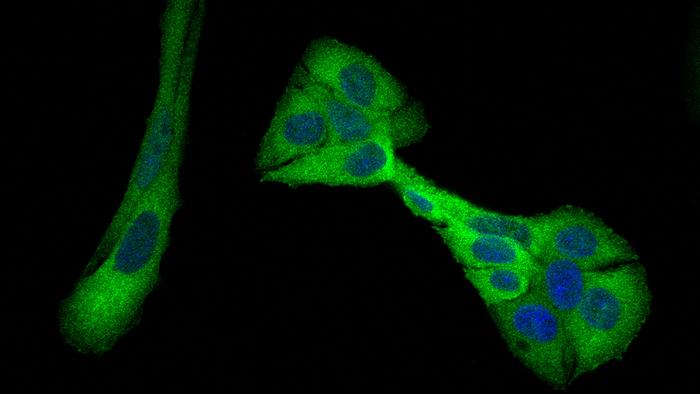Cancer cells have voracious appetites. And there are certain nutrients they can’t live without. Scientists have long hoped they might stop tumors in their tracks by cutting off an essential part of cancer cells’ diet. But these cells are crafty and often find a new way to get what they need. How? By reprogramming their metabolism and switching to backup food supplies.

Credit: Lukey lab/CSHL
Cancer cells have voracious appetites. And there are certain nutrients they can’t live without. Scientists have long hoped they might stop tumors in their tracks by cutting off an essential part of cancer cells’ diet. But these cells are crafty and often find a new way to get what they need. How? By reprogramming their metabolism and switching to backup food supplies.
Now, Cold Spring Harbor Laboratory (CSHL) Assistant Professor Michael Lukey has found a way to deprive cancer cells of both a vital nutrient and their backup supply. In lab experiments with breast cancer cells, patient-derived tissue models, and mice, this strategy killed breast cancer cells and shrank tumors.
How does this work? Let’s go back to cancer metabolism. Aggressive cancer cells avidly consume an amino acid called glutamine. They use this vital nutrient to generate the energy and materials needed to grow and replicate.
Previous studies have shown that starving cancer cells of glutamine or preventing its conversion into metabolites can stop the cells’ growth in the lab. However, in recent clinical trials, breast cancer patients didn’t benefit from a drug taking this approach. This suggests that breast cancer cells can adapt and find a way to live without glutamine.
Lukey and postdoc Yijian Qiu saw the same thing in their lab. They noticed that breast cancer cells adapt to glutamine starvation by switching on a pathway that generates a critical metabolite called alpha-ketoglutarate, normally derived from glutamine. This enables cancer cells to continue producing the energy and building materials they would otherwise get from glutamine. It was a lightbulb moment for Lukey’s lab.
“That made us think, could we exploit this for cancer therapy?” Lukey recalls. “Could we target glutamine metabolism? We know the cells adapt to that. So, could we simultaneously target their adaptive response by inhibiting the pathway?”
The approach was successful, killing breast cancer cells in lab dishes and effectively treating tumors in mice. Lukey’s team saw tumors stop growing and even shrink with the combination treatment. The animals remained healthy.
Inhibitors of both metabolic pathways are now under further investigation. Lukey notes that these pathways might be especially important for breast cancer metastasis to different tissues, including some that are very difficult to treat. “Brain metastases in particular lack any effective therapies,” Lukey explains.
Lukey hopes his lab’s combination therapy could ultimately improve the efficacy of glutamine metabolism inhibitors in the clinic. This could mean effective new treatments that target cancer’s metabolic addictions.
Journal
Nature Metabolism
Article Title
The unique catalytic properties of PSAT1 mediate metabolic adaptation to glutamine blockade
Article Publication Date
27-Aug-2024



